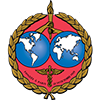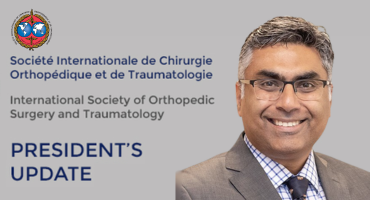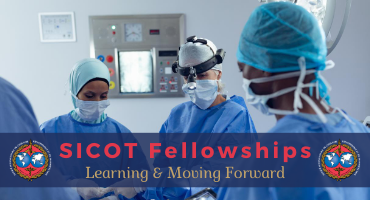Women in Orthopaedics: United Kingdom
 Emma Taylor Emma TaylorLondon, United Kingdom |
I can remember quite clearly when I realised that orthopaedics was a career option for me. It was during my first clinical year as a medical student and I was on a placement at a District General Hospital assisting in theatre in the middle of the night and I was so interested in the case that I had forgotten the time. The following morning I was in fracture clinic with my supervising consultant who encouraged me saying that I had a knack for spotting fractures on X-rays. At that time the number of female orthopaedic consultants was probably in single figures, but it never occurred to me that it wasn’t a sensible choice, and I have never had anything but support from my trainers.
I think I was very lucky to have been preceded on my training rotation by Scarlet McNally who had four children during her training, so my trainers were accustomed to the idea that a trainee might need to take some maternity leave. Due to the fact that my husband worked away from home, I needed to take things a step further and arranged to come back after having my oldest child on a part-time basis so that I could manage my hours and childcare. I knew this would lengthen the time I took to complete my training, but working part-time made it possible for me to balance work and home life. Having a part-time trainee was a new venture for my department. However, once we worked out where the needs of the department and my training needs met, a timetable was organised which supported both. One advantage to the other trainees was that I could only realistically fulfil my on-call duties at the weekend, which meant that they were less likely to be on duty at these times.
I chose to be a hand and wrist specialist at about this time as I had found myself enjoying the subject immensely. I love the intricate anatomy and the fact that a whole range of techniques are utilised, from arthroscopy to microvascular surgery, osteotomies to challenging tendon reconstructions. I do wonder whether my choice was influenced by my gender, but know enough men who chose to be hand surgeons which makes it less of a possibility. I was one of three women in my year on the training programme. One went on to become a spinal surgeon and the other specialised in hip surgery.
I have worked at University College London Hospital now for ten years as a consultant specialising in hand and wrist surgery and have been fortunate to be able to develop my interest in education, initially as the Royal College of Surgeons college tutor for my hospital, overseeing the surgical training, particularly of the more junior trainees, managing their rotations and supporting them with any problems that they may have. I thoroughly enjoyed this role and began to see that this might be something I would be interested in taking further, alongside my career as a hand surgeon. This led to me being appointed as the Director for Postgraduate Medical Education, a post which oversees the training of all 500 or so trainees at our hospital, regardless of specialty. This was a step up for me in terms of being a manager, with an administrative team to supervise, and a new set of skills to master, including how to deal with training inspections, national surveys and reports, and how to ensure that all our trainers are appropriately skilled for their training role. Since 2015, I have been the Director of Education for the trust, looking after the training and education of approximately 8,000 staff. It has been fascinating for me to explore how education can support the strategic objectives of the organisation and understand how a large organisation works.
It always felt a bit strange to me during my training that female orthopaedic surgeons were a bit of a curiosity. After all, if you have the knowledge to be able to make a decision and the skill to perform the procedure, then there is absolutely no reason why you should not be doing the job. Interestingly, the Royal College of Surgeons’ website states that only 11.1% of surgical consultants were females in 2016, despite an equal number of males and females admitted to medical school for many years. This is a big improvement from 3% in 1991, but we still have a long way to go, and orthopaedics has the lowest percentage of female consultants of any surgical specialty in the United Kingdom. One reason for the slow increase might be the fact that, like me, many women choose to work flexibly for part of their training, so take longer to reach consultant level. Whatever the reason, it is my personal belief that there is no room in such a demanding specialty for positive discrimination. In the interests of the patient, the most appropriate person should always be chosen for any available role. The more important, and perhaps interesting question, is why more women are not choosing orthopaedics as a career. Whilst large numbers are dismissing this as a potential career option, we are not able to ensure that we have the best pool of candidates for any vacant training programme or consultant post.
A lot is made of career choices being influenced by role models, and that having a woman as a role model might encourage other women to pursue a career in surgery. This was not my personal experience, and so I tended to dismiss this as something that might be important. However, during my first year as a consultant, I had a medical student sitting with me in clinic who told me that she had not realised that women could pursue a career in surgery. This made me really stop and think about how role models and stereotypes might be influencing the choices made by our medical students and the most junior doctors. As a result I always make a point of asking medical students what specialty they wish to pursue. A large number of women wish to become paediatricians or obstetricians, largely because they perceive these to be female friendly specialties. In reality, I have found that a career in orthopaedics is well suited to family life, with consultants in most hospitals rarely having to be in the hospital late into the night, whereas paediatricians and obstetricians seem to be in the hospital frequently at these times.
Culture, or perceptions of this, must also play a part. There is no doubt that orthopaedics does have the image of being a very macho specialty, and, in my experience, it does help to have a reasonably thick skin and a good reserve of resilience at times. However, this is a feature shared with any highly pressured acute specialty. This culture is now changing, with male colleagues having to do their share of childcare and school runs in the same way that I do, as the number of families with both parents working increases.
Personally, I am extremely grateful that I chose orthopaedics as my specialty. The nature of the case mix, workload and types of procedural skills required make it a varied and interesting career. The ability to subspecialise means that you have the satisfaction of really becoming an expert in your field, and, in my case, has meant that I have been able to balance my clinical work with a second career in education, enabling me to develop new skills and continue to learn.















